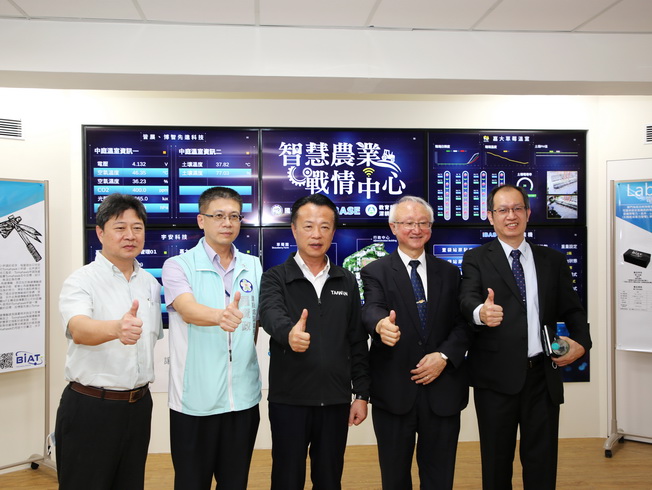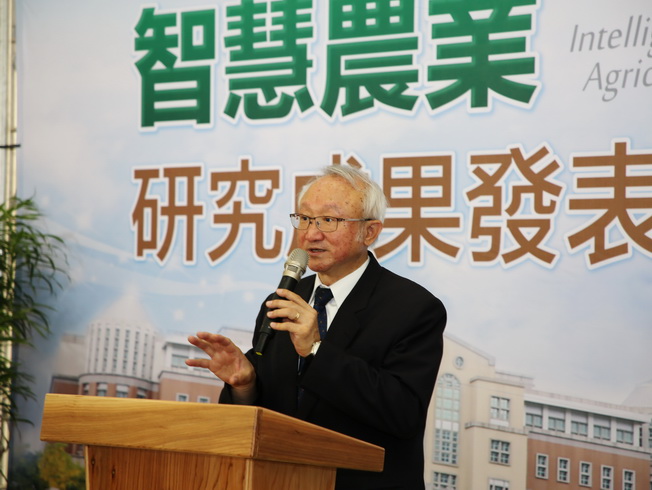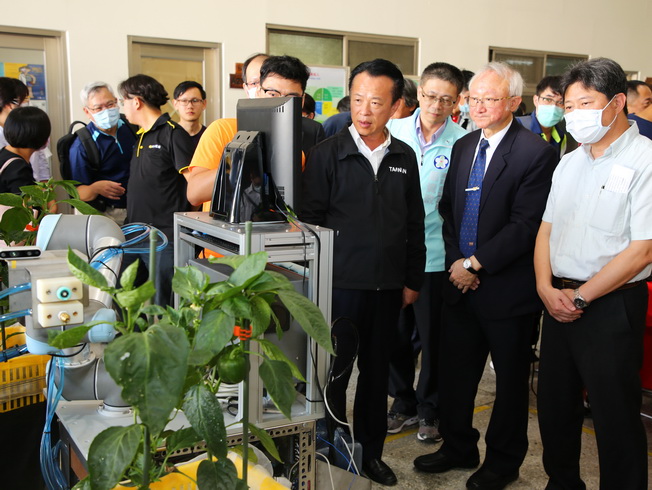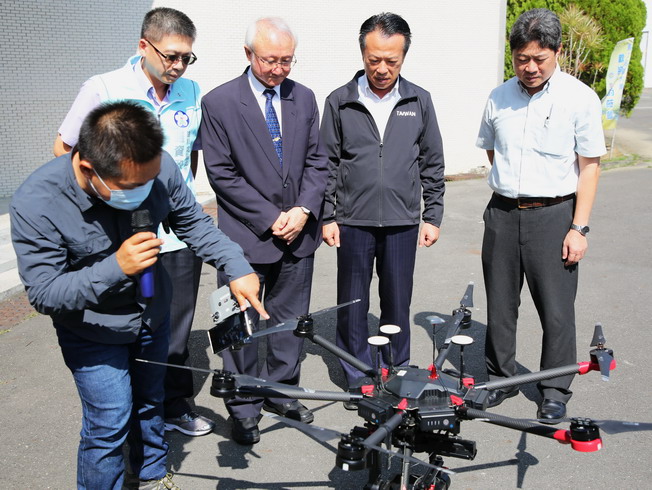|
|
 |
|
| |
 |
News |
 |
Browsing: 2191 times

|
Date:2020-11-19
Bracket:2020 NCYU NEWS
Department:ncyu
|
 NCYU Presents Remarkable Research Results on Smart Agriculture: Saving Time and Labor with Technology in Agriculture, Fisheries and Animal Husbandry
NCYU Presents Remarkable Research Results on Smart Agriculture: Saving Time and Labor with Technology in Agriculture, Fisheries and Animal Husbandry
The “101-year Anniversary Smart Agriculture Research Results Presentation” of National Chiayi University took place at the Machinery and Electronics Building, Lantan campus, on the morning of Nov. 19th. The event aimed to showcase results of smart agricultural research by the NCYU Intelligent Agriculture Research Center since its establishment two years ago. In his remarks, President Chyung Ay indicated that climate change has become a major challenge and increases the frequency and impact of natural disasters in recent years. The ageing of rural population and declining birthrate have contributed to labor shortages. All these factors have exerted an enormous impact on agricultural productivity. The food crisis and safety of agricultural and food products have become focus of attention. Located in the Yunlin-Chiayi-Tainan region, one of the agricultural hubs in Taiwan, NCYU has been actively integrating the professional teams across colleges in conjunction with the “smart agriculture 4.0” policy of the Council of Agriculture. They adopt smart technology to enhance the agricultural production, adjust agricultural production management methods, and strengthen research and development related to scientific and technological innovation.
According to Weng Chang-Liang, Magistrate of Chiayi County, science and technology are key to future development of agriculture. In the future, an unmanned aerial vehicle (UAV) aerospace base will be built in Chiayi County, one of the major agricultural regions in Taiwan. Outstanding drone manufacturers will be invited to be stationed in the county for innovative research. Technological agriculture allows farmers to manage diseases and pests or fields more easily whether in breeding or planting, which in turn increases planting areas for greater benefits. Agricultural technology is pivotal to the development of smart agriculture in both land use and facility utilization. They look forward to more opportunities to collaborate with NCYU, which has a vibrant research and development culture.
On the eve of the 101-year anniversary, the NCYU Intelligent Agriculture Research Center and the Office of Research and Development co-organized the Smart Agriculture Research Results Presentation. The presentation featured the Smart Agriculture Command Center System, co-founded with the IPC factory of iBase Technology Inc. AIoT technology of smart IoT was utilized to collect data regarding, for example, agricultural production and fertilizer management. By conducting big data analysis on agriculture via the remote monitoring system, they hoped to explore the optimum cultivation conditions for agricultural production. The team led by President Chyung Ay used AI deep learning plus a six-axis robotic arm to develop a plant protection robot that can identify sweet pepper pests, and precisely apply pesticides to reduce the risk of pesticide exposure. The team guided by Vice President Chishih Chu developed the Golden Bead Soybeans, microbial breeding, and value-added application of the whole jelly mushroom. They also developed a series of products including “Chiachu” and “Wood Shochu” distilled from NCYU-Tainan No.2 Rice, plum wine, virgin soy sauce, and soybean yogurt. Huaang-Youh Hurng, Director of the Alumni Center, and Associate Prof. Huang Wei-Jen from the Department of Biomechatronic Engineering worked together to develop the self-propelled plant protection robot for field production management, which saves labor and time. Chen Qing-Tian, Chairman of the Department of Civil and Water Resources Engineering, employed the IoT technology to build a smart irrigation system. By estimating field irrigation water demand in real time by means of monitoring components for water-saving management, the system can effectively help improve the utilization and deployment of water resources.
In addition to crop production technology, achievements in animal husbandry industries were also demonstrated at the event. The teacher-student team collaborated to build a smart chicken poultry farm for real-time remote monitoring, which employs object detection and grouping technology for automatic flock distribution recognition. The technology using multiple detection and the target detection algorithm “You Only Look Once” (YOLO) for poultry health detection and identification was also developed. By carrying out chicken tracking and weight estimation with deep learning technology, they hoped to establish a method for real-time weight estimation of large numbers of chickens. As far as aquaculture was concerned, the teachers and students cooperated to develop the fish fingerlings calculation technology that utilizes machine learning and image recognition. It is expected to assist fishermen in counting the number of fish fingerlings in a time- and labor-saving way.
In conjunction with the Special Chapter for Drone of the Civil Aviation Act, the four-block test site built with concrete for unmanned helicopters and multi-rotor aircraft of different levels was established in August by NCYU. Located on the riverbed on the west side of Chun-Huei Bridge, the test site was proud to be the first in southern Taiwan. They have been preparing practitioners for certification of plant protection drones pesticide spraying. Apart from studying UAV aerial images, they also make highly precise terrain elevations with UAV aerial imaging, thermal imaging and multi-spectral imaging, which can be used to explore the land use and interpret the bare land. The UAV technology can be used to interpret land use conditions, estimate crop yields and assess damages to agricultural lands. An interdisciplinary program is also offered on the smart agricultural industry, which bears witness to the university’s unsparing effort to cultivate professionals in smart agricultural technology.
Known for the quantity and quality of professional research, the NCYU teacher team has been dedicated to agricultural studies for more than a hundred years. They have been proactively faciliating teamwork across disciplines within the university, and developing smart agricultural technology with a view to offering guidance and assistance to farmers in solving problems. Through increasing agricultural productivity, they hoped to drive the development of agricultural economy, and contribute to the progress of smart agricultural technology in the country.
|



|
 |

|
 |
|
 |
 |
|
|


 ][
][